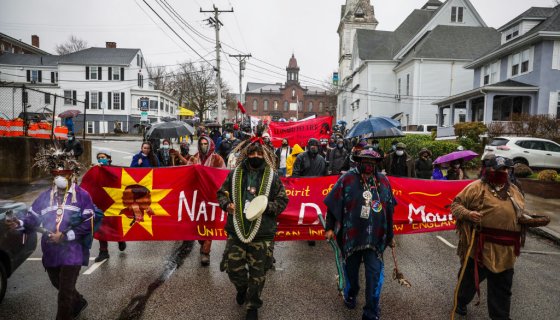
Source: Boston Globe / Getty
People with their eyes open to accurate history have been aware of the Thanksgiving jig for a long minute. Many Indigenous folks curve the false narrative (the Indians and Pilgrims had a happy feast, yeah right) of the holiday and instead have been observing the National Day of Mourning.
But what exactly is it?
Let’s start with what you probably learned in school was that the Pilgrims and Puritans brought their tradition of Days of Fasting and Days of Thanksgiving to New England in the 1600s, and in 1621 in Plymouth, Massachusetts thanksgiving was established thanks to a good harvest. They allegedly celebrated with the Wampanoags, Native Americans whose land would eventually be pilfered by the colonizers, but more on that later.
Thanksgiving as we know it in the United States—the final Thursday of November, was established by President Abraham Lincoln in 1863, with the ulterior motive of unifying a country divided due to the then-ongoing Civil War. See how history gets easily gets misconstrued or just not told?
In the fall of 1970, Massachusetts was holding a Thanksgiving celebration aimed at bigging up the 350th anniversary of the landing of the Mayflower. One of the invited speakers was Frank “Wamsutta” James, the leader of the Wampanoag Tribe of Gay Head. However, Wamsutta’s speech was too real since he was candid about the raw deal Indigenous people received thanks to their land being usurped and epidemics wiping out their population. Instead, the PR team wanted them to read a speech they created that emphasized brotherhood.
Instead, a number of Indigenous leaders met in Connecticut and organized the first National Day of Mourning on Thanksgiving Day, November 26, 1970, at Cole’s Hill, in Plymouth, Mass. Some of the amended speech from James reads as, “We forfeited our country. Our lands have fallen into the hands of the aggressor. We have allowed the white man to keep us on our knees. What has happened cannot be changed, but today we must work towards a more humane America, a more Indian America, where men and nature once again are important; where the Indian values of honor, truth, and brotherhood prevail.”
Where is the lie?
James’ is speech is noted as one of the first public criticisms of the Thanks-taking (our words) holiday from Native American groups. Now the annual National Day of Mourning honors Indigenous ancestors and puts a spotlight on Native American people while pushing to make all the facts about the Thanksgiving Holiday known. Or more simply, the aim is never to forget about the genocide of millions of Native people and the theft of their lands.
For many Black people, Thanksgiving is about family and friends, with not a thing to do about a Pilgrim. So, we salute our Native American brothers and sisters during the National Day of Mourning on general principle.
Respect.
—
Photo: Getty
